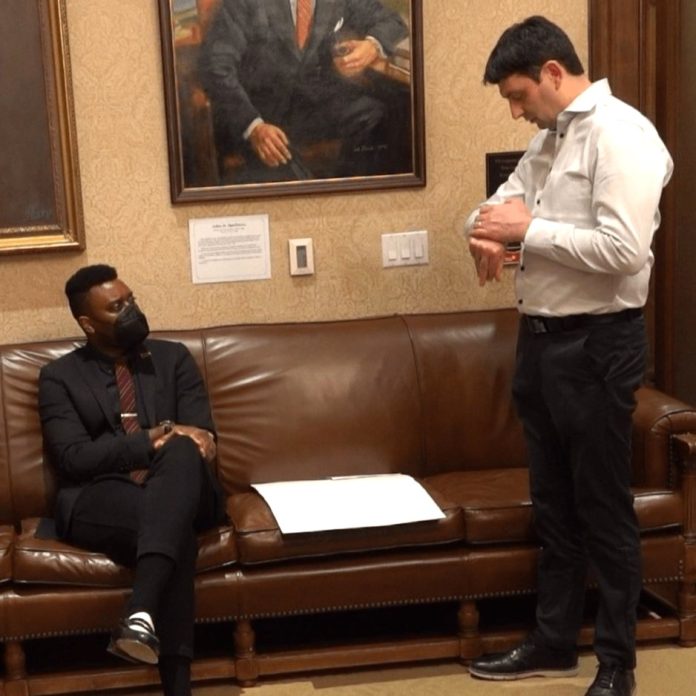
Educators sought a meeting with Ferguson to voice concerns about social service cuts, but were rebuffed by a governor more focused on appeasing the rich.
On Wednesday, April 23, with four days before the end of the Washington state legislative session, educators gathered in Olympia to support progressive revenue and fully funding our schools as the state balances its budget. They were joined by healthcare workers, rural fireland workers, and by a group of mourners for Ayşenur Eygi, the American citizen and Seattleite killed by Israeli soldiers in September of 2024 – whose calls for an American investigation into her death the U.S. government has thus far ignored.
At the rally on the capitol steps, speakers like Senator Rebecca Saldaña and Seattle Mayoral candidate Katie Wilson spoke to the need for new progressive revenue. One educator from the rural Raymond school district, which has roughly 40 educators, reported they could lose up to half of their staff for the coming school year. Though disparate on the surface, these movements were unified in opposition to Bob Ferguson’s threat to veto the proposed wealth tax.
It is precisely this selective deafness that motivated socialist Representative Shaun Scott (D-43rd, Seattle) and a group of Seattle educators, independent of that protest, to stage a sit-in at Ferguson’s office.
Educators across the state of Washington are straining themselves to meet the needs of children struggling to navigate an often hostile and confusing political environment, to say nothing of how Covid lockdowns have affected their mental and social development. Speaking as one of those educators, I can say the situation is far from hopeless if education institutions receive the resources necessary to meet this significant and ever-evolving challenge.
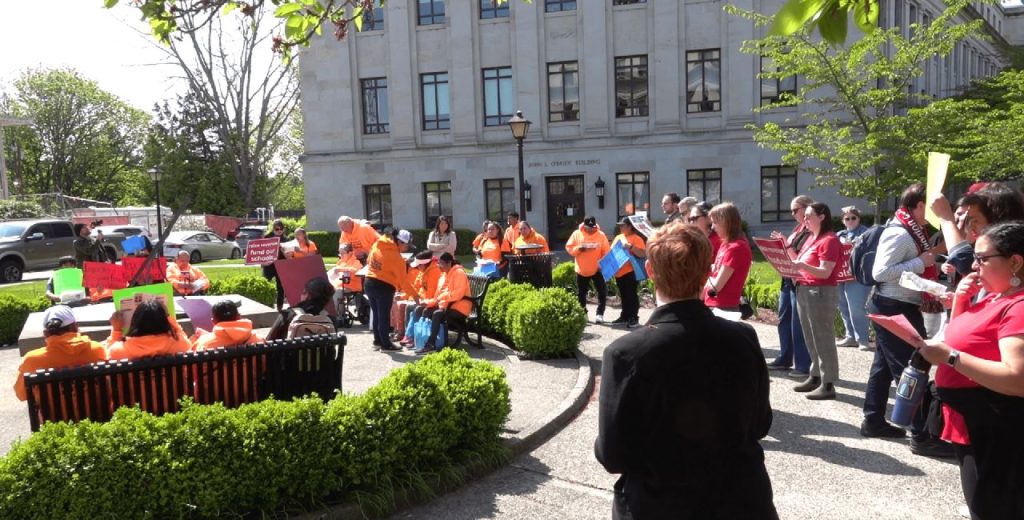
However, fully funding education will only support one pillar of the state’s social foundation: children’s lives do not begin and end at school. How can I expect a student to concentrate on writing essays about poetry when they tell me they’re worried their mother “will work too hard and faint again” just to support their family? What bright future do they have to look forward to when the average price of a home exceeds the lifetime earnings of many workers? Do not even the best schools sink when built upon a social foundation of quicksand?
Educators grew fed up after Ferguson ignored pleas given through proper channels by the people who helped him into office. They wanted clarity on why the governor feels these cuts are appropriate. Ferguson is opposing the majority of his own party by threatening to block progressive revenue, ignoring former Governor Jay Inslee’s warnings against the drastic cuts Ferguson supports as the Seattle Times reports that Ferguson’s popularity is rising amongst Republicans — and plummeting among Democratic and independent voters. In an TVW interview, Senate Minority Leader John Braun (R-20th, Centralia) said that Ferguson was a “breath of fresh air.”
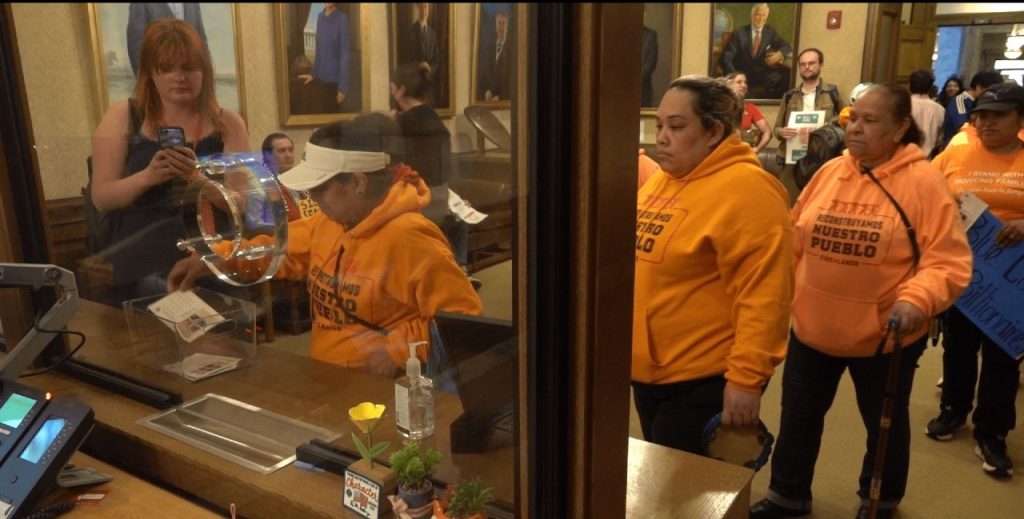
After the rallies on April 23rd, workers from across the state left postcards at Ferguson’s office requesting a meeting. They hoped the new executive might demonstrate his appreciation for their concerns. Instead he blew them off. In one of the final days of the 2025 session, the governor was not in Olympia but instead at a fundraising luncheon for the Housing Development Consortium in Seattle.
That’s why three educators, along with Scott, stayed seated in the Governor’s office beyond 5pm, when security warned the office would be closing.
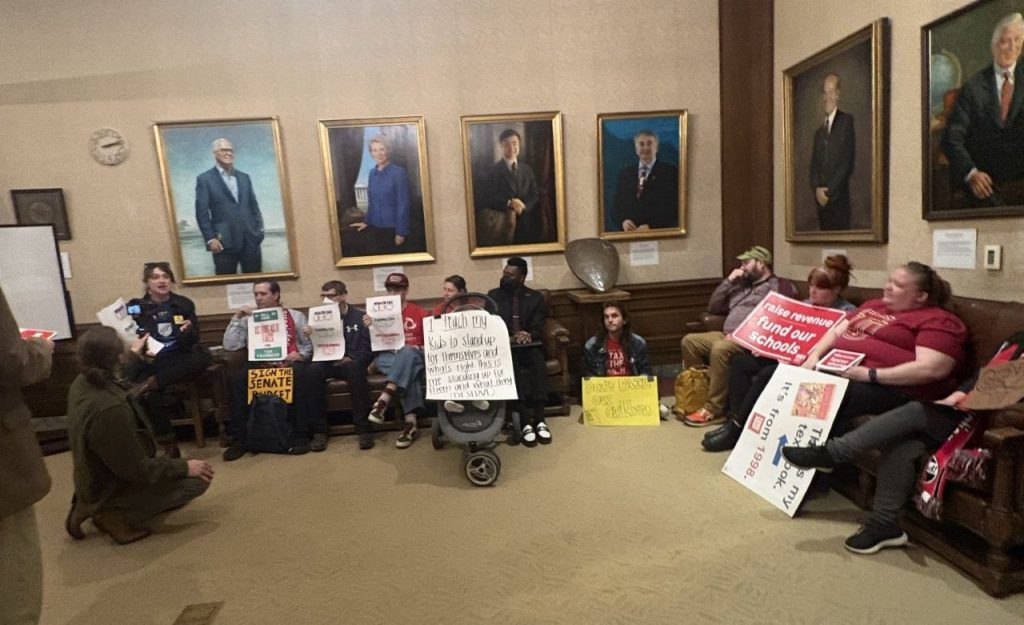
Capitol security informed everyone that the governor wasn’t present and that they needed everyone to leave or they’d be cited for trespassing.
“Could his staff come out so we could get a meeting with him, get him on the horn?” one of the educators asked, but to no avail. Scott and the educators remained in the office after a security officer notified them that they would be cited for trespassing.
Despite their threats, security did not force anyone from the office, instead entering into a dialogue and listening to their concerns (unlike the governor).
“We’re sitting,” Scott said. “We didn’t come here with weapons, we didn’t come here with the intent to disrupt. We came here with the intent to have a conversation.”
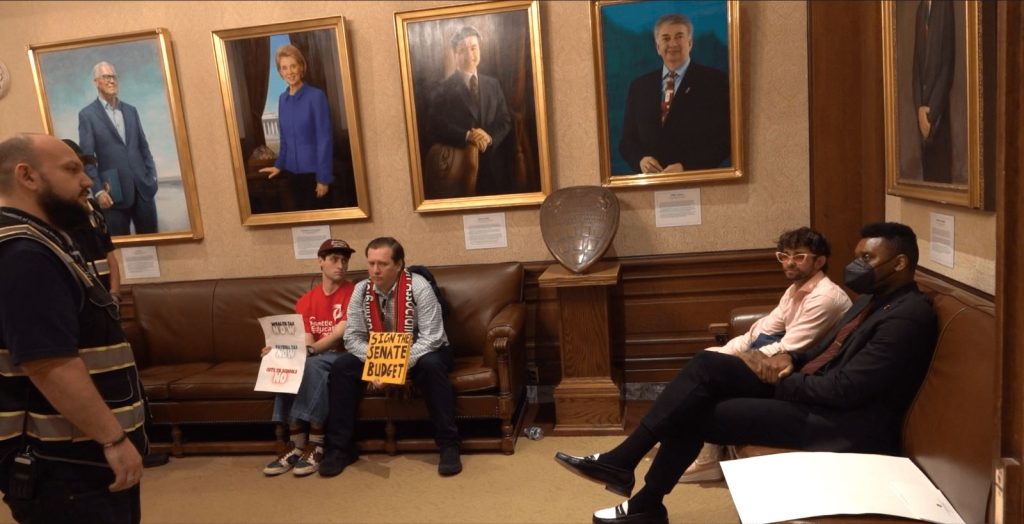
Shane Esquibel, the governor’s interim chief of staff, soon arrived to direct Scott to the governor’s website to schedule a meeting, and said that he couldn’t guarantee one before leaving to answer a call coming in on his smart watch.
“Maybe [a meeting with the governor] would help him save him from himself in the sense that many of the cuts that are facing the people of our state are very unpopular,” Scott said after Esquibel had left. “We feel he should probably have a sense of urgency around making sure that he doesn’t go down this road. Nobody here would prefer to be here. We’re taking this action because we believe, with the session almost being done five or six days from now, many of the other alternatives have been exhausted.”
Educators couldn’t help but feel like their voices didn’t mean much next to the richest in the state, which seem to be driving the governor’s political stances.
“We’ve come down so many times this session asking to have a conversation with the governor,” an educator sitting beside Scott said. “But Brad Smith (the president of Microsoft) gets a little bit mad, can get Bob Ferguson right on the phone and say ‘hey, don’t do that,’ and he says ‘okay cool,’ because he can spend a couple million dollars to fund a PAC. We don’t have that ability, sadly. As a public school teacher, I don’t have enough money quite yet to do that.”
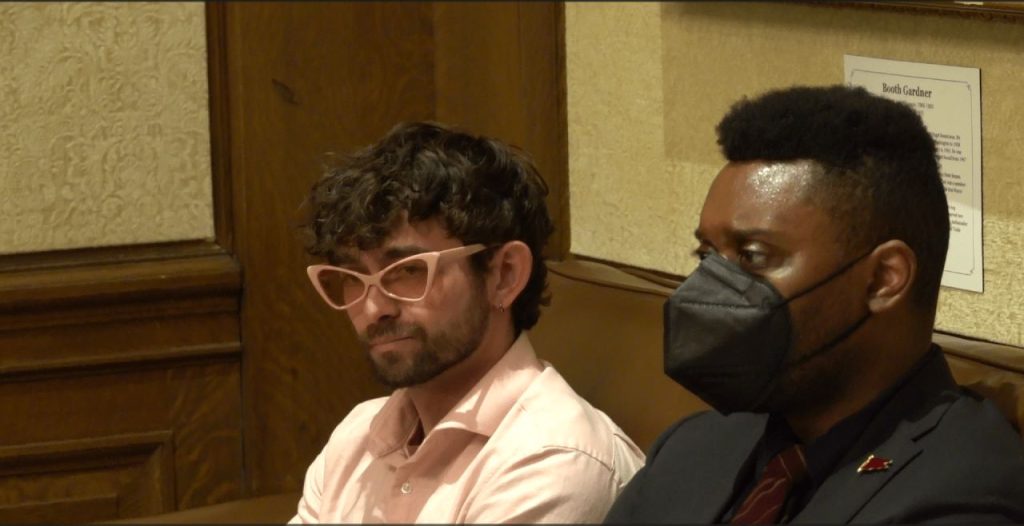
Scott recalled some of the recent cuts that have come before the legislature in the preceding days: child care and early learning access, clawing back benefits from the blind and disabled, delays to public pensions, and the closure of disability centers. “The question a lot of people in our state are asking is why those cuts are even being considered before even implementing a test case wealth tax at a very low level,” Scott said.
Cuts to social programs will have big impacts on working families.
“If the governor can’t meet with us, there is the expectation that he would also not be able to meet with the families who had kids that got kicked off childcare. He probably would not be able to meet with the retirees who are going to see declining pension investments in the coming years, nor with the teachers who are going to be taking delayed pay due to another bill that passed,” Scott said. “These are going to present a lot of problems to a lot of people who are never going to get an opportunity to travel down here to say anything to the governor.”
“There are many people who are still asking for answers about these questions,” Scott added. “This [sit-in] is a mechanism to see if we can get the accountability that is being denied through other means.”
“I think it’s great that these decisions matter to you that much,” a capitol security officer said in reply. “So is the wealth tax one of your main concerns at this point?” the officer asked.
Scott answered, “Well there are a number of issues. Number one: the fact that you’re more willing to have this conversation with us, as somebody who’s going to see pension reductions, than [Ferguson] is. The second issue has to do with the fact that we’re not even considering passing a wealth tax that tests levels. It’s not about the wealth tax in and of itself, it’s about harm reduction”
Scott went on to emphasize the seriousness of the situation while recognizing the political irony of a Democratic governor as committed to austerity budget cuts as Ferguson: “The frustration being felt among lawmakers pales in comparison to the pain that is felt among public sector employees, retirees, kids, and people depending on our institutions to work for them. In this climate, there is very little difference between the course of action being taken in this Washington and the other Washington. We see mass layoff of public employees and ransacking of the social safety net federally, and as of yet there is no distinction between that policy direction and the one that is being pursued here.”
“I wish I had answers for you,” the security officer replied.
Eventually, security decided to leave the office, and Representatives Natasha Hill (D-3rd, Spokane), Lisa Parshley (D-22nd, Olympia), and Darya Farivar (D-46th, Seattle) left the floor to join Scott and express their solidarity with his cause.
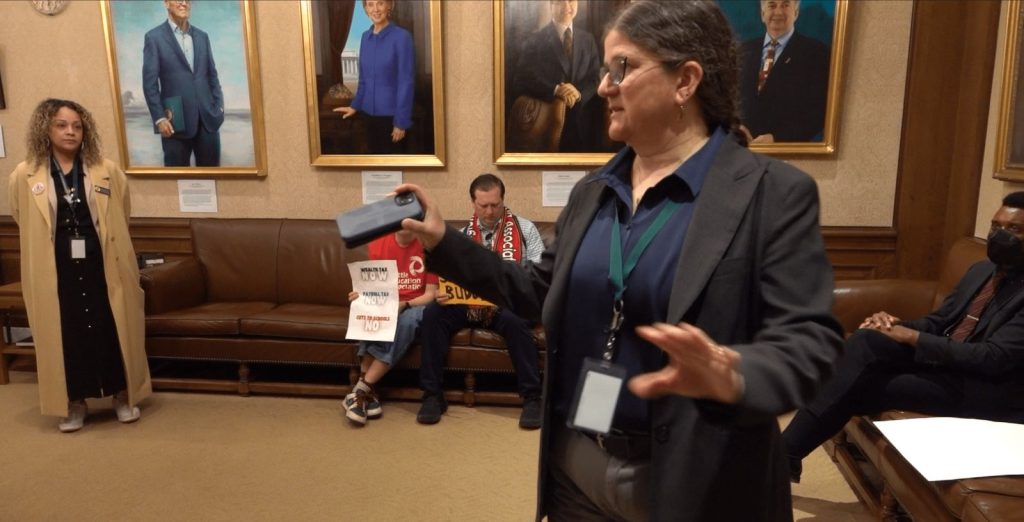
With votes still pending on the house floor, Scott and the other legislators returned to the floor at 7pm. Hopefully, the work these and other legislators have done to provide the governor with plans to balance the budget without significant cuts to the social foundations of the state will not be squandered by a veto.
Millions of voters elected Ferguson at least in part because they believed he would protect Washington from a Republican administration in the other Washington. However, it appears the governor has more in common with the slash and burn tactics of Elon Musk and Donald Trump than the passionate and hardworking people who are trying to keep this state functioning, like Scott and the representatives who joined his demonstration.
When I was in the governor’s office just before the sit-in, a security guard said it would be impossible for Scott to obtain a meeting because “the governor has no intention of returning to Olympia.”
“Ever?” I quipped.
Now I speak seriously: If the governor still has no intention meeting with those legislators working tirelessly to hold this state together, if his priority is cozying up to the megarich, if this so called “Democrat” governor can support no cuts to highway expansions but billions taken from social services, he should never return. Would it not be better if those who feel the cracks in society’s foundations occupied his office indefinitely?

Collin Reid
Collin Reid is an educator who moved to the Central District of Seattle in 2024 after having lived and worked in St. Petersburg Russia for eight years. His background in political science and international experiences led him towards urbanism and transportation as the foundational elements of society. He is a member of the Seattle Democratic Socialists of America.

